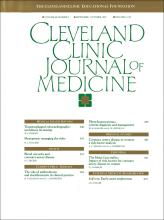Table of Contents
Highlights from Medical Grand Rounds
- Transesophageal echocardiography: usefulness increasing
This dramatic cardiac imaging technique is proving valuable in the operating room and the intensive care unit, as well as in the echocardiography laboratory.
- Menopause: managing the associated risks
Menopause is an excellent time to reassess a female patient’s health habits and the need for health maintenance measures.
Letters to the Editor
Review
- The role of blood viscosity in the development and progression of coronary artery disease
Accumulating evidence suggests that increased blood viscosity is an independent risk factor for atherosclerotic heart disease and its complications.
Current Drug Therapy
- The role of azithromycin and clarithromycin in clinical practice
Clinical trials show these to be excellent alternatives to conventional agents for treating infections of the respiratory tract, skin, and skin structures. Their high cost, however, may prohibit routine use.
- Pheochromocytoma: current diagnosis and management
In patients with paroxysmal or sustained hypertension, especially if symptoms are present, pheochromocytoma should be suspected.
- Primary aldosteronism: new approaches to diagnosis and management
Uncertainties persist regarding optimal screening methods, the diagnostic process, diagnostic criteria, and differentiation of the growing number of etiological subgroups.
Original Study
- Coronary artery disease in women: a risk-factor analysis
Coronary artery disease (CAD) has long been considered a disease of men. However, the risk factors for CAD are similar for women and men, and these factors need to be considered when counseling women for the prevention of CAD.
- Coronary artery disease in young women: risk factor analysis and long-term follow-up
Risk factors include hypertension, hypercholesterolemia, diabetes mellitus, familial coronary disease, and smoking. The long-term prognosis is excellent for those without advanced diabetes mellitus and renal failure.
- Stereotactic and computer-assisted neurosurgery at the Cleveland Clinic: review of 501 consecutive cases
By allowing precise preoperative planning, image-guided stereotactic neurosurgery provides a safe, accurate alternative to many traditional techniques in the diagnosis and treatment of intracranial lesions.



